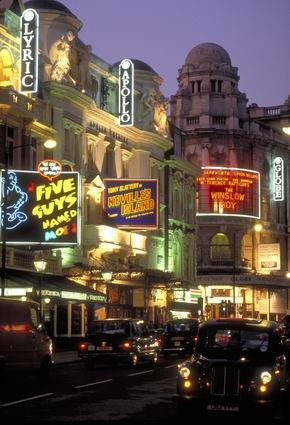The West End enjoyed record box office sales in 2011 for the eighth year in a row, according to figures released by The Society of London Theatre (SOLT).

The 2011 figures, which include takings at 52 major commercial property theatres in and around central London, revealed record sales of £528,375,874 in 2011, a 3.1 per cent rise on a like-for-like basis on the £512,331,808 taken in 2010.
The increase in VAT from 17.5 per cent to 20 per cent is thought to have been behind much of the growth, with the increase estimated at about one per cent once VAT is stripped out.
The average attendance per performance went up 10 tickets from 2012 to reach 770, however overall attendance for 2011 fell just shy of 14 million-down 1.73 per cent on 2010 and 2.5 per cent down on 2009’s record high of 14,257,922.
According to SOLT this is due in part to a sharp increase in dark weeks in several bigger West End commercial venues during changeovers and installation periods for mega-musicals such as; Shrek the Musical, The Wizard of OZ, Rock of Ages, Ghost the Musical and Matilda the Musical. As a result, the commercial venues had 146 dark weeks in 2011-when theatres are closed to the public, compared with just 85 dark weeks in 2010.
The Society said the rise in sales could be attributed to the success of sell out productions such as Matilda the Musical and the contributed success of Les Miserables, now in its 26th year.
Plays had a bumper growth year, recording a revenue rise of 10 per cent (to £177,842,072) thanks to such sold-out productions such as Frankenstein, Jerusalem, Much Ado About Nothing, The Lady Killers and One Man, Two Guvnors. Attendance also increased by two per cent.
Takings went up one per cent for performances in other categories, such as opera, dance, entertainment and performance, to hit £82m even with a four per cent fall in attendance figures.
The data relates to the 52 commercial property theatres represented in membership of the Society of London Theatre, which primarily include all the commercial West End houses, but also comprise of grant-aided flagships such as the National, Almeida, Royal Court and Donmar Warehouse.
However, Michael Billington, the Guardian’s theatre critic, sounded a warning about the figures, saying: “Dark weeks can be a convenient alibi for a slight drop in attendances.
“I hope we’re not heading for a situation like Broadway, where revenues increase because of ever higher ticket prices while attendances slowly decline”.
Using the SOLT figures, theatre website Whatsonstage.com showed how the rise in ticket prices between 1986 and 2011 compared to audience figures. In 1986 there were 213 productions and audiences of 10.2 million-meaning the average ticket price in 2011 was £37.97 versus £10.95 in 1986. Attendance figures then peaked in 2009 at 14.2m and are now at 13.9m with 256 new productions.
Speaking to Whatsonstage.com, Mark Rubinstein, President of SOLT attributed rising costs to a variety of factors including costlier, more high-tech productions, VAT receipts, inflation and rising venue and ticketing technology expenses.
He said: “The profits in the average producer’s pocket have not been getting fatter”.
Terri Paddock, Whatsonstage editor, told the BBC: “It is an expensive business, but the industry is aware that prices can’t just rise inexorably. There is a point at which the market will bear no more and we are all going to have to be looking at those issues over the next few years.”
The big question mark for the west end this year could be the 2012 Olympic Games with mixed predictions of how things will turn out. The National Theatre is optimistic, pointing to a healthy summer advance ticket sales for War Horse. Meanwhile, Andrew Lloyd Webber has warned of a “bloodbath” and is planning to close three of his seven west end commercial property theatres.
Rubinstein said there are reasons to be hopeful, including advance bookings for this year being up on last year. “Some shows are substantially up for the Olympic period.” He added the society, would be working hard to attract visitors from the Olympic site into the west end with both live and video entertainment promoting commercial property theatre.
He further added: “Also, looking one, two, three years down the line, that promotion of London across the world is a fantastic advert and that can only be beneficial in the long term.”